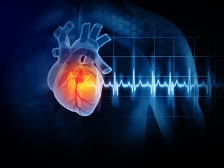Health & Fitness
Control Your Risk for Heart Disease
Hackensack Meridian Health offers two screenings that enable doctors to quickly detect issues that can lead to a heart attack or stroke.

This is a paid post contributed by a Patch Community Partner. The views expressed in this post are the author's own, and the information presented has not been verified by Patch.
According to the World Health, American Heart Association (AHA) and other healthcare organizations, as much as 80 percent of premature heart attacks and strokes are preventable. While this may be true, aging increases risk of heart disease, and some conditions can be hereditary, passed on from parents, and not controllable.
There are many risk factors that can be controlled. They include not smoking, avoiding diabetes and obesity by eating a heart healthy diet, that is low in saturated and trans fats, and reducing salt intake and blood pressure, among others. The AHA recommends two eating plans for better heart health, a Mediterranean-style diet and the DASH diet, a.k.a. Dietary Approaches to Stop Hypertension. The DASH diet allows more low-fat or fat-free dairy products and meat, while the Mediterranean diet includes regular use of olive oil.
“Routine screenings and regular doctor visits remain important since all risk factors are not under our control, and people might be mitigating their controllable risk factors, but may still have underlying heart and vascular conditions,” said Hackensack Meridian Jersey Shore University Medical Center Cardiologist Daniel Kiss, M.D., who is the AngioScreen® Program Director for Hackensack Meridian Health.
Advanced screenings give clinicians a clear picture of your risk of heart disease or stroke. Hackensack Meridian Health (HMH) provides New Jerseyans with two advanced screenings that enable cardiologists to quickly and precisely detect narrowed or blocked arteries that can lead to a heart attack or stroke without invasive procedures. Within a 15-minute span, AngioScreen® screens for heart and blood vessel disease by blending several distinct screenings and measurements. These include tests that are used to determine the health of vessels in the neck, heart and legs, as well as blood pressure and pulse, the heart’s rhythm and detection of abnormalities before an emergency. “The goal is to identify any concerns, so that treatment can begin early, whether with medication, lifestyle changes or interventional procedures,” said Dr. Kiss.
Another quick screening, CT Calcium Scoring, is a 10-minute scan searching for calcium-containing, hardened plaque in the arteries surrounding the heart. Patients with higher calcium scores have a greater risk for a heart attack, heart disease or stroke. “This scan helps cardiologists determine the value of possible preventive interventions and provides them with another, accurate gauge of a patient’s risk,” said Dr. Kiss.
“Cardiovascular care has advanced so rapidly in recent years, it’s miraculous, whether through our new medications, leading-edge heart devices, and minimally invasive techniques and procedures. Cardiologists today are saving and enhancing the lives of patients in ways unheard of 20, 10, or even just 5 years ago. Heart procedures that would have warranted a few days hospital stay now can be completed on an outpatient basis. It is remarkable,” said Dr. Kiss.
Take a 10-Question Heart Disease Quiz
This post is an advertorial piece contributed by a Patch Community Partner, a local brand partner. To learn more, click here.